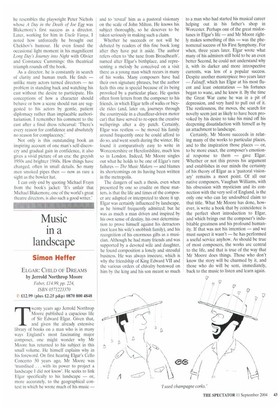Music in a landscape
Simon Hefter
ELGAR: CHILD OF DREAMS by Jerrold Northrop Moore Faber, £14.99, pp. 224,
ISBN 0571223370 £12.99 (plus £2.25 p&p) 0870 800 4848
Twenty years ago Jerrold Northrop Moore published a capacious life of Sir Edward Elgar. Given that, and given the already extensive library of books on a man who is in many ways England's most fascinating major composer, one might wonder why Mr Moore has returned to his subject in this small volume. He himself explains why in his foreword. On first hearing Elgar's Cello Concerto 50 years ago, Mr Moore was 'transfixed . . , with its power to project a landscape I did not know'. He seeks to link Elgar specifically to his landscape — or, more accurately, to the geographical context in which he wrote much of his music— usic— and
and to 'reveal' him as a pastoral visionary on the scale of John Milton. He knows his subject thoroughly, so he deserves to be taken seriously in making such a claim.
Whether he succeeds or not will be debated by readers of this fine book long after they have put it aside. The author refers often to 'the tune from Broadheath', named after Elgar's birthplace, and representing a melody he conceived on a visit there as a young man which recurs in many of his works. Many composers have had their own signature phrases, but the author feels this one is special because of its being provoked by a particular place. He quotes often from letters from the composer to his friends, in which Elgar tells of walks or bicycle rides (and, later on, journeys through the countryside in a chauffeur-driven motor car) that have served to re-open the creative wellsprings after a dry patch. Certainly, Elgar was restless — he moved his family around frequently once he could afford to do so, and went south during the winter. He found it comparatively easy to write in Worcestershire or Herefordshire, much less so in London. Indeed, Mr Moore singles out what he holds to be one of Elgar's rare failures — The Music Makers — and blames its shortcomings on its having been written in the metropolis.
The dangers of such a thesis, even when presented by one so erudite on these matters, is that the life and times of the composer are adapted or interpreted to shore it up. Elgar was certainly influenced by landscape, as he himself frequently admitted; but he was as much a man driven and inspired by his own sense of destiny, his own determination to prove himself against his detractors (not least his wife's snobbish family), and his recognition of his enormous gifts as a musician. Although he had many friends and was supported by a devoted wife and daughter, he found composition a lonely and stressful business. He was always insecure, which is why the friendship of King Edward VII and the various orders of chivalry bestowed on him by the king and his son meant so much
to a man who had started his musical career helping out in his father's shop in Worcester. Perhaps one of the great misfortunes in Elgar's life — and Mr Moore rightly makes something of this — was the phenomenal success of his First Symphony. For when, three years later, Elgar wrote what many of his admirers still hold to be an even better Second, he could not understand why it, with its darker and more introspective currents, was less of a popular success. Despite another masterpiece two years later — Falstaff, which has Elgar at his most fluent and least ostentatious — his fortunes began to wane, and he knew it. By the time the Great War came he was in a pit of depression, and very hard to pull out of it. The restlessness, the moves, the search for novelty seem just as likely to have been provoked by his desire to take his mind off his deepening dissatisfaction with himself as by an attachment to landscape.
Certainly, Mr Moore succeeds in relating many of the works to particular places, and to the inspiration those places — or, to be more exact, the composer's emotional response to them — gave Elgar. Whether or not this proves his argument and establishes in our minds the certainty of his theory of Elgar as a 'pastoral visionary' remains a moot point. Of all our native composers, Vaughan Williams, with his obsession with mysticism and its connection with the very soil of England, is the only one who can lay undoubted claim to that title. What Mr Moore has done, however, is write a book that by coincidence is the perfect short introduction to Elgar, and which brings out the composer's indubitable greatness and his profound humanity. If that was not his intention — and we must suspect it wasn't — he has performed a useful service anyhow. As should be true of most composers, the works are central to the life, and that is true of the way that Mr Moore does things. Those who don't know the story will be charmed by it, and those who do will be sent, immediately, back to the music to listen and learn again.










































































 Previous page
Previous page